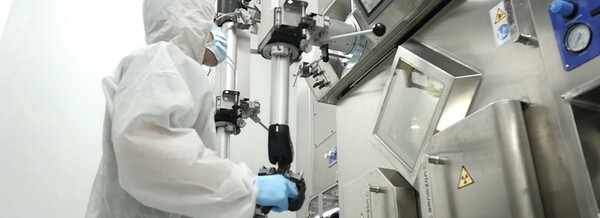Korean radiopharmaceutical company FutureChem said last Thursday that it has completed a phase 2 trial in Korea for FC705, its targeted radiotherapeutic candidate for metastatic castration-resistant prostate cancer (mCRPC)—an advanced form of the disease that continues to progress despite hormone-suppressing treatments.

The study enrolled 20 patients who received up to six doses of FC705 at 100 millicuries (mCi) at eight-week intervals. Millicuries measure the radioactivity in radiopharmaceuticals, and according to FutureChem, 100 mCi represents about half the dose commonly used in other therapies.
Among the 15 patients included in the final efficacy analysis, the average number of doses was 3.4. Despite the lower dose, FutureChem said 73.3 percent of patients experienced a 50 percent or greater drop in prostate-specific antigen (PSA) levels, a key biomarker in prostate cancer monitoring.
Broader efficacy outcomes included an objective response rate of 60 percent and a disease control rate of 93.3 percent, based on PSMA PET/CT imaging, a sensitive scan that uses prostate-specific membrane antigen (PSMA) as a tracer to detect and monitor prostate tumors throughout the body.
On the safety front, FutureChem said adverse events occurred in 60 percent of patients, with only two grade 3 drug-related events reported.
The company has submitted an investigational new drug (IND) application to the Ministry of Food and Drug Safety to begin a phase 3 trial. The study will compare FC705 combined with standard of care (SOC) against SOC alone. The drug has already been granted orphan designation in Korea, opening the door to conditional approval upon successful phase 3 clearance.
Related articles
- FutureChem moves new prostate cancer drug into phase 3 trial in Korea
- FutureChem selected for Korean ARPA-H Project to accelerate radioligand therapy development
- FutureChem presents phase 2 results for prostate cancer drug at APPS Conference
- FutureChem releases phase 2 interim results for radiation therapy ‘FC705’
- AstraZeneca Korea reapplies for Lynparza reimbursement in prostate cancer
- FutureChem's FC303 meets phase 3 goals, setting stage for 1st Korean-developed PSMA PET imaging agent
- FutureChem's radiopharmaceutical wins MFDS approval for phase 3 prostate cancer trial
- FutureChem’s prostate cancer drug FC705 shows phase 2 progress, eyes fast-track approval

